Packing for a trip always holds the potential to be a fraught process. The desire to ensure you have covered for every eventuality balanced against weight restrictions is exceptionally problematic when your vape, spare vape, spares for the spare vape, batteries and bottles of juice could land you with a £2500 fine or time inside the Bangkok Hilton - Bang Kwang Central Prison.
Life is all about the experience and part of that was about to be nicotine gum for the first time at 40,000 feet as the best part of a thirty-hour journey lay between our front door and the hotel. My hat goes off to anybody who has successfully quit smoking with an oral product. There’s no dressing it up, they taste foul.
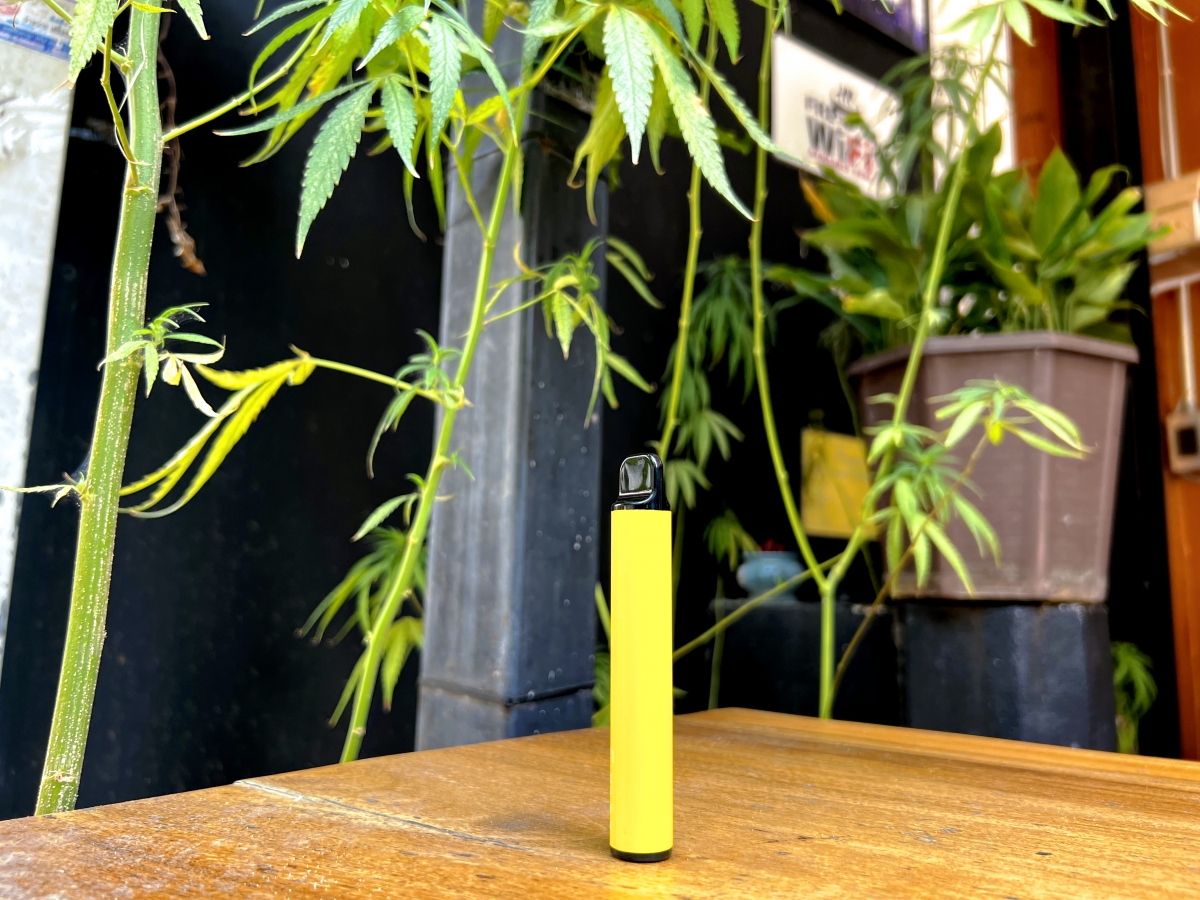
That, and it wasn’t until I was marching through to the connecting flight masticating like a Friesian on cud, I suddenly remembered a half truth about chewing gum and Singapore. Disposing it discretely in a bin in case the gum police were watching. I spent the next flight eating sweets by the fistful. The wife wasn’t happy, they were her sweets.
Channel 5’s Inside Phuket Airport depicts a taskforce of smiling yet observant customs officers going through bags and looking for pocket bulges on the hunt for vapes. The reality was completely different; we saw nobody and sailed straight through. More importantly, so did the two disposables I bought from a supermarket in the UK the day before departure.
Not normally my product of choice, I figured I could pretend they were in my bag by mistake and wouldn’t be out of pocket if I’d had to throw them. I was stealth vaping seconds after walking through the terminal door – small inhales, holding, then exhaling nothing. It’s what little disposables excel at as they can also be hidden in a fist.
So, here’s me in Phuket with a brace of 2mg/ml disposable ecigs - the kind of things that bring down societies. Cue Judas Priest backing soundtrack. I am officially breaking the law.
Thai legislators like banning vaping. They ought to, they’ve done it a few times. Like similar countries with a loose approach to law enforcement, previous bans were met with indifference by the public and police. This changed a few years ago.
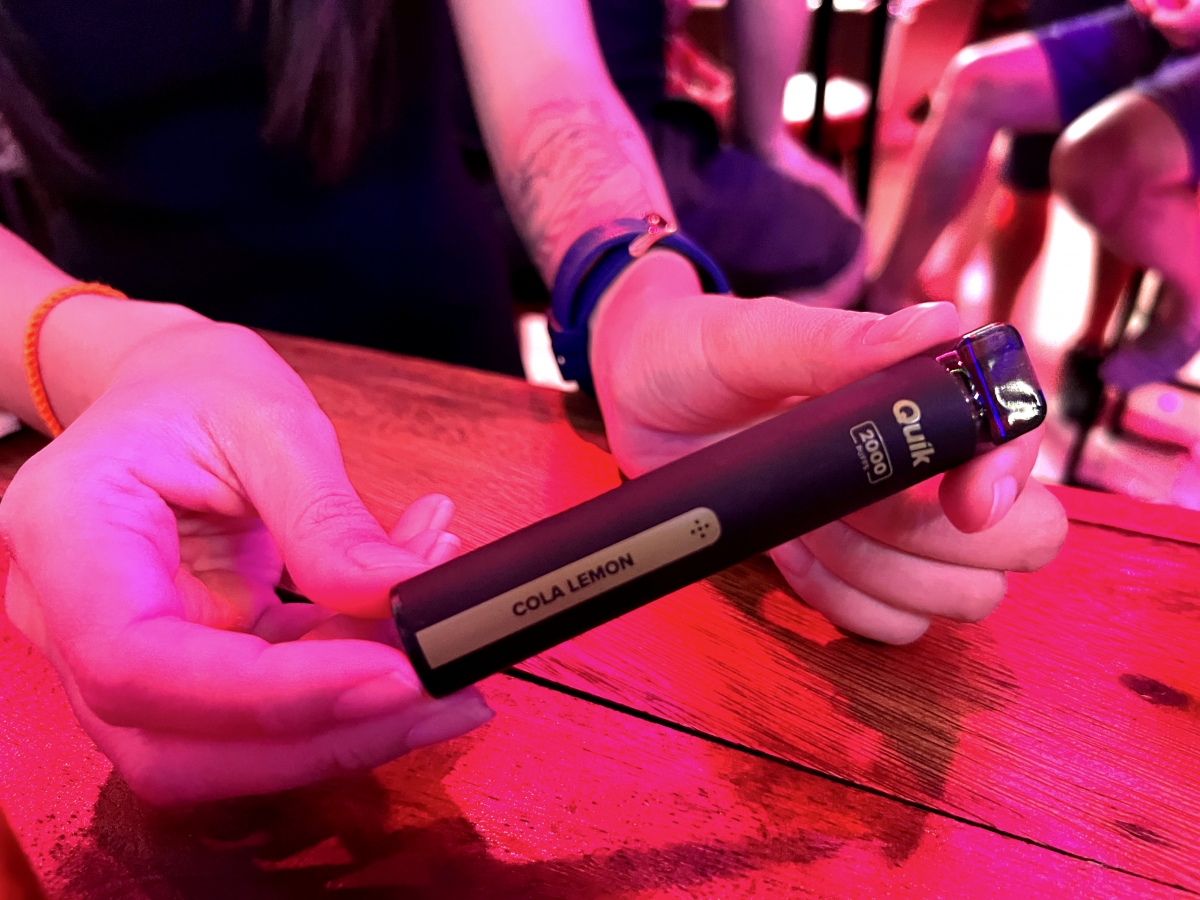
The UK Government had begun to start handing out strong words of warning back in 2017: “You can’t bring vaporisers (like e-cigarettes and e-baraku) or refills into Thailand. These items are likely to be confiscated and you could be fined or sent to prison for up to 10 years if convicted.”
In 2019, Dutch DJ Gerard Jan Joling found himself doing an unexpected appearance in a Pattaya jail cell. Yes, Eurovision fans, 1988 and 2009 Song Contest Gerard Jan Joling. He and a couple of sound engineers were caught vaping and given the option of five years in prison or paying the equivalent of an £800 fine.
While Joling was enjoying police hospitality because of his ecig, the Thai Health Minister was working on legalising cannabis so that it could be sold and used alongside cigarettes and alcohol. The war on vaping wears a cloak of “protecting the children”, but you really have to ask what he thinks he’s protecting them from?
Numbers of those being fined increased and British travel agents began issuing strong notices, cautioning against all importation or use. My worst-case scenario was to spend a fortnight chewing gum or, worse, buying a pack of 20.
Well, second worst.
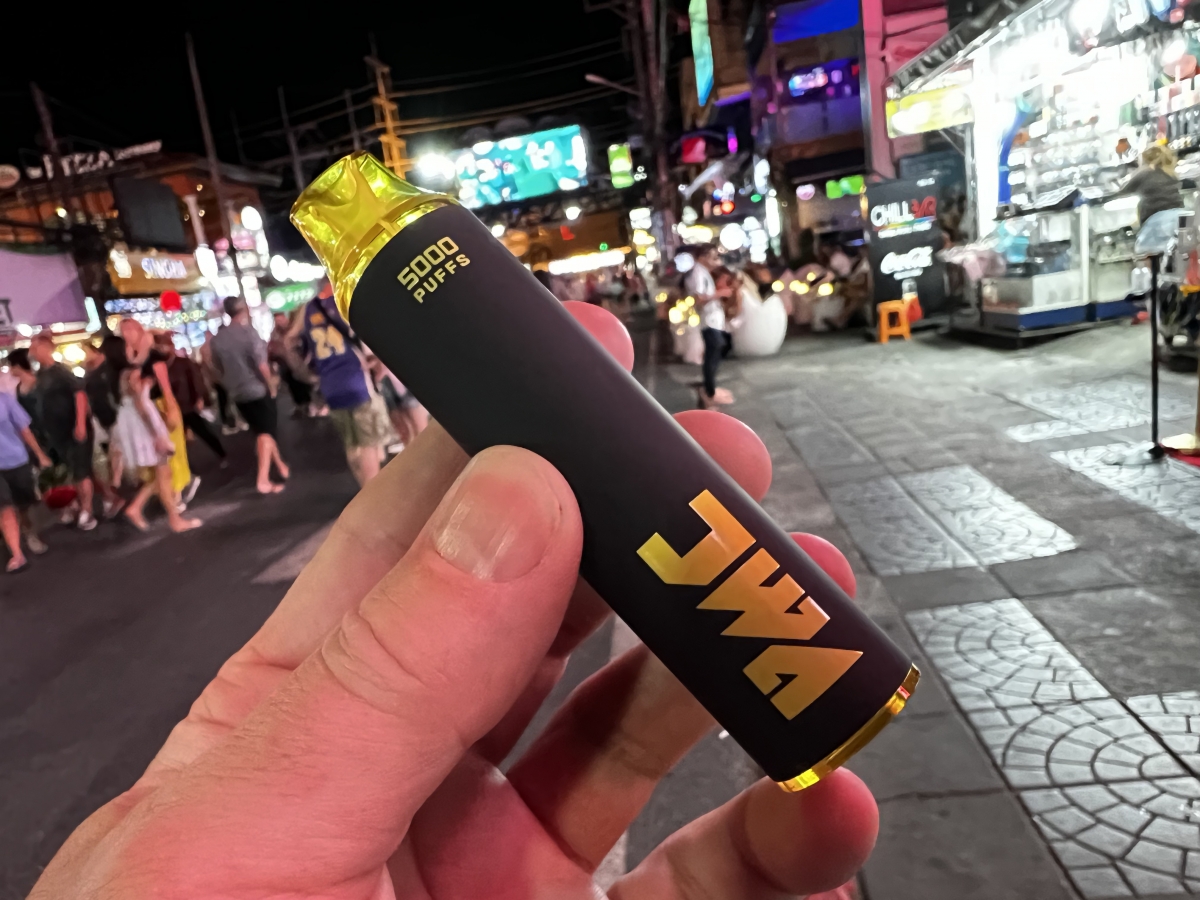
Coming in first place would be the inevitable negotiation with corrupt policemen seeking to extort a bribe. This scenario has now overtaken tales of arrests and is cropping up more regularly than Stacey Dooley on BBC1.
Two days after landing I was being collected at 6am from the hotel for my first open water scuba day. Pleasantries exchanged with an American couple in the taxi van, I received my first admonishment for being an ecig user. Neither smokers nor ex-smokers, I was hearing the impact of a Bloomberg anti-vape campaign from their lips – the same powerful disinformation programme that is influencing the Thai government. No evidence was sufficient for them, I was a bitter disappointment.
Fortunately, having disappointed my parents over many decades, this was water off a scuba air tank for me. What was striking was that they didn’t say a word to the horde of smokers puffing away in-between dives. If you’re going to use nicotine then you sure better be risking cancer as a punishment for your sin, I guess.
That evening I figured that I’d be needing to find somewhere selling illicit black market vapes. Clearly, this isn’t a promotion or review, but it wasn’t that urgent as the pair of 88Vapes disposables lasted me into the second week.
The hunt proved fruitless until I decided to target any shop selling electronic things. Instant success, in a fashion.
“No, I do not know about the vapes,” he said.
Wondering if he fancied me as part of a sting operation, I discretely waved mine and fibbed about it running out.
A rapid response: “Aha, I have a big one, would you like to see?”
Well, the wife is busy by the hotel pool…so when in Thailand, I reasoned.
I accepted his advance. Out from under the desk a heavy box was lumped onto the counter. No bartering attempted; I added a 2000 vape rechargeable disposable to my illegal collection.
On the dive boat the next day, I quickly discovered the price of my reluctance to barter. My dive instructor told me how he had caught his 14 year old daughter vaping. “You can get them online, very cheap,” he said just before collapsing in laughter when I told him what I’d paid.
1500 baht from the shop works out £37.50. He assured me that these would normally cost 300 baht (£7.50).
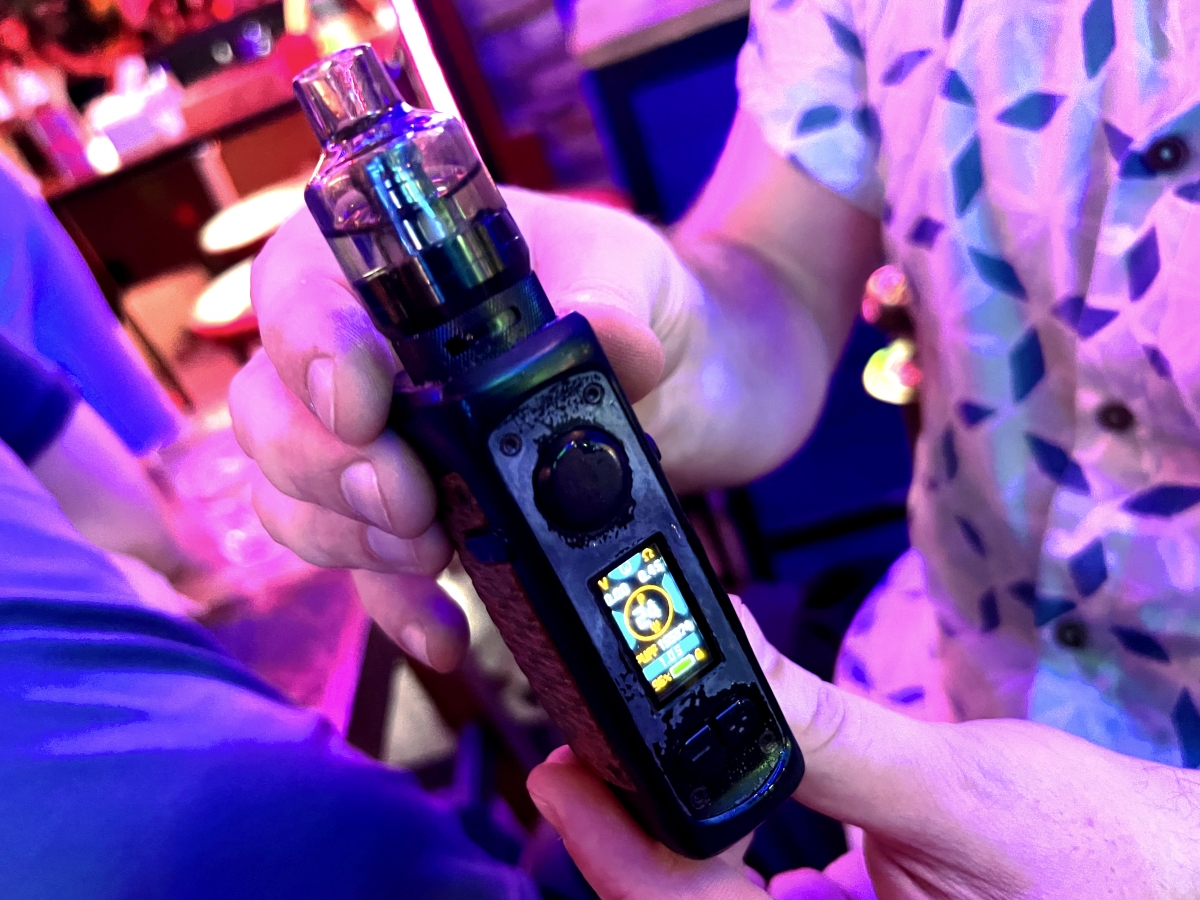
This was the point I began to notice just how prevalent vaping was. Thais and tourists all openly using their devices, shops and street vendors with trayfuls touting them for sale. It seemed like I was the only one attempting some form of discretion.
Come the second week, I was summoned to speak to an Australian trucker by his wife. She’d seen me vaping near the swimming pool and held concerns about her heavy smoking, two-time heart attack husband.
As with the American couple, the same predictable concerns about e-cigs, but this time the conversation led to a more positive outcome, a convert to the idea of tobacco harm reduction, and a happier woman.
With my disposables on hand all dying halfway through one evening out, I tried a shop on Bangla Road – one of Patong’s more interesting streets.
Again, “1500 baht”.
The mention of them costing 300 online was met with faux horror and denial, but we ended up at 700 which, going by our expressions, neither of us was happy with.
I didn’t have any qualms in breaking a nation’s laws when those rules are so clearly ridiculous. With the volume of people I saw doing the same thing, and the one’s I spoke to about their devices as I photographed them, they felt the same. I stayed stealth vaping till the end though, I didn’t have the bravery of the lad with his subohm cloudchucker advertising his presence to all as he walked off to climb into a tuktuk.
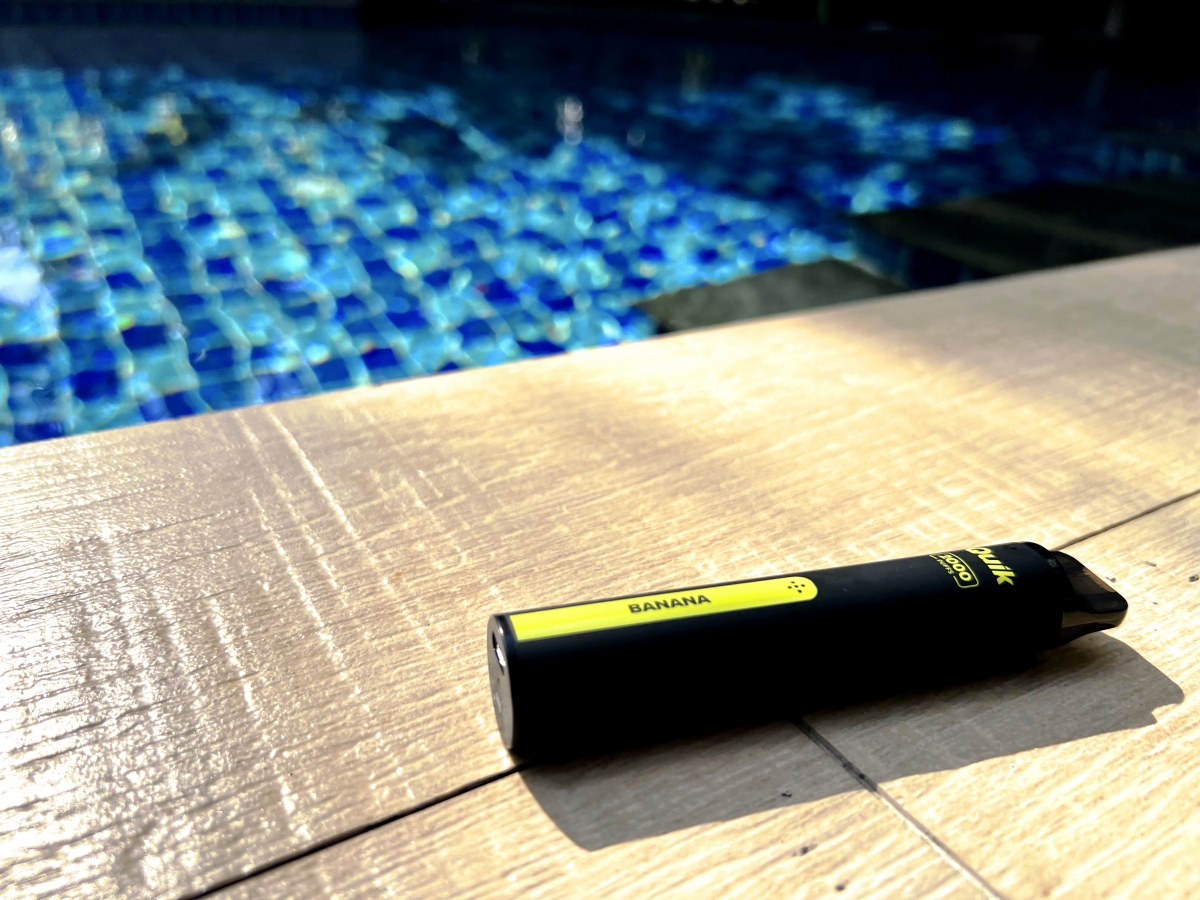
Apparently, so it is claimed by ministers, vaping causes damage to Thai children’s lungs. During our final week, the government issued a warning because, “widespread farm burning and forest fires have created a smog that's even thicker than usual, which is choking communities and exposing them to respiratory disease.” This week a similar warning has been issued in Phuket. The evidence says that vaping doesn’t even register on that scale.
Criminalising smokers just because they want to reduce their harm exposure just doesn’t make any sense – especially now you struggle to find a spot on the island where you aren’t swamped in legal cannabis smoke.
It didn’t seem worthwhile to risk bringing the working devices home and attempt to get them through baggage checks. Having risked it for a fortnight, it seemed stupid to get a possible fine just as we were leaving. My fears were unfounded as a couple began stealth vaping the second we touched down in Singapore and made our way across to the connecting flight home, clearly having walked through the Thai terminal with them in their pockets.
I arrived in Thailand with vapes, sourced replacements, and saw many vapers using their devices openly. The police didn’t appear to care, and shops were happy to show you their range of products on request. I landed back home with my nicotine gum packet pretty much intact – and it will now go into the bin.
So, should you do the same? Should you risk a large fine or time in jail? No. The fines are in place and have been imposed, those who fail a roadside personality test have gone on to spend time in jail – we’ve covered the stories often on Planet of the Vapes over the last seven years. The warnings are not overblown, the risk is real.
Clearly, many are choosing to ignore advice to avoid vaping. A year ago, rumours were that Thailand was on the verge of cancelling the ban. For the sake of Thai smokers, vapers and tourists, here’s hoping they embrace the evidence, see sense, and finally get this done.
Photo Credit:
Images © Dave Cross, author
Dave Cross
Journalist at POTVDave is a freelance writer; with articles on music, motorbikes, football, pop-science, vaping and tobacco harm reduction in Sounds, Melody Maker, UBG, AWoL, Bike, When Saturday Comes, Vape News Magazine, and syndicated across the Johnston Press group. He was published in an anthology of “Greatest Football Writing”, but still believes this was a mistake. Dave contributes sketches to comedy shows and used to co-host a radio sketch show. He’s worked with numerous start-ups to develop content for their websites.
Join the discussion
Harm Reduction For The Rich
The United Kingdom risks becoming a harm reduction country only for the wealthy, according to Michael Landl of the World Vapers’ Alliance
CAPHRA Highlights Tobacco Control Flaws
The Coalition of Asia Pacific Tobacco Harm Reduction Advocates highlights the flaws in tobacco control which has led to the rise of black market in Australia
A Missed Opportunity at COP10
The Smoke Free Sweden movement says that COP10 was a missed opportunity to save millions of lives
COP10: Promote Tobacco Harm Reduction
Experts with Smoke Free Sweden are emphasising the urgent need for a Tobacco Harm Reduction approach at COP10






-listing400.jpg)




